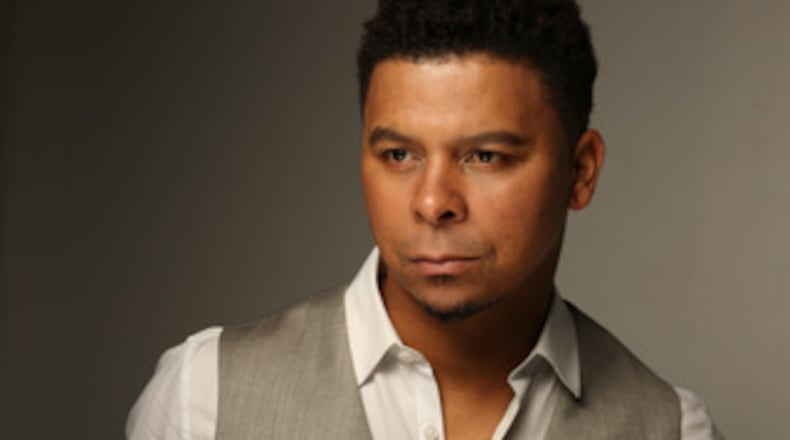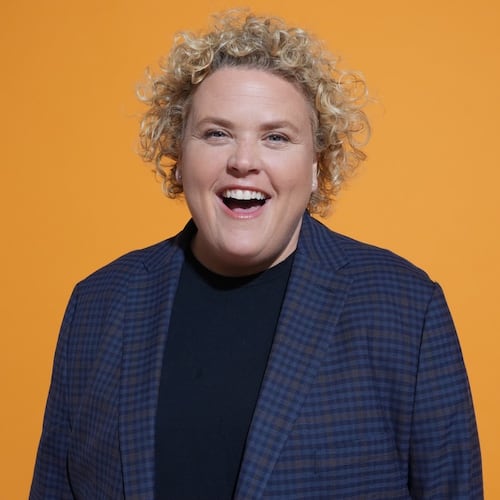This story was originally published by ArtsATL.
Victor Ryan Robertson’s musical journey has been unique. The young tenor from Atlanta originally went to college on a tennis scholarship, but subsequently turned in his locker key to pursue a busy livelihood as a rock singer.
Fate brought him together with Mary Ann Hill, professor of voice at Georgia State University, who led Robertson to realize that his vocal gift might take him much further than he imagined. Robertson honed his skills at Georgia State, and then in the young artist program of Tri-Cities Opera in Binghamton, New York, and as a chorister in Atlanta.
Atlanta audiences will have an opportunity to see Robertson with The Atlanta Opera, where he will portray four different characters in Leonard Bernstein’s “Candide.” Performances start March 4 at the Cobb Energy Performing Arts Centre and run through March 12.
Credit: Courtesy of Tadpole Communications
Credit: Courtesy of Tadpole Communications
Since turning to opera professionally, Robertson has enjoyed a burgeoning career throughout the United States and Europe in an eclectic repertory ranging from the Italian bel canto to classic musical theater, and the most cutting edge of contemporary vocal works.
In the space of one year, Robertson debuted at the Metropolitan Opera (in Lehár’s “The Merry Widow”), jumped into the cast of The Phantom of the Opera on Broadway, and made his Kennedy Center debut as Benny “Kid” Paret in Terence Blanchard’s “Champion.” He has won particular acclaim as Count Almaviva in Rossini’s “Il Barbiere di Siviglia” and as Sportin’ Life in Gershwin’s “Porgy and Bess.”
Robertson was the recipient of the coveted Ovation Award for his performance in Baz Luhrmann’s “La Boheme” in Los Angeles, and recently scored a Grammy nomination for his work in the new recording of Anthony Davis’s “The Life and Times of Malcolm X.”
ArtsATL caught up with Robertson after a rehearsal to discuss his rather unorthodox career trajectory and his upcoming performances of Candide.
Q: You began your career as a rock singer. How did the transition to opera happen?
A: I had a full tennis scholarship but was getting burned out playing five to six hours a day. I was always singing, and I joined rock bands. At first, I thought it was something I could do to earn money on the side, but before you know it, I was singing all over the Southeast. I was living in Atlanta, and ended up meeting Mary Ann Hill, who is a professor of voice at Georgia State. She saw me in a concert and came up after the show and told me I should be singing opera. I thought, “Aw, hell no,” but I was smart enough to know that I needed to work to expand my vocal range. I called her the next week, and she said if I was really serious, she might be able to find me some money to train in the program there. So, I became a student at Georgia State. Before long I got another scholarship, then another.
I bypassed some things. She got me connected to the young artist program at Tri-Cities Opera. Usually by the time you get to a young artist program as an opera singer, you already have your undergrad degree and your Masters. I kind of took the Nureyev route and skipped the corps de ballet.
Q: A move from rock to opera is not unheard of -- bass-baritone Yevgeny Nikitin comes to mind -- but it isn’t typical. Were there particular vocal challenges involved?
A: It all came together like a script. Most of the time when I was in rock bands we didn’t have monitors, so I had to project in order to hear myself; I needed to hear if I was in tune. For whatever reason, I was doing that correctly. I was using decent technique. I don’t know how; it just came naturally. When Mary Ann heard me, she asked who I had trained with. I said nobody. Come on, I was singing Led Zeppelin. But she said my basic technique was solid. So the transition to a different discipline was not difficult.
You sing off the voice in rock, you use chest voice, straight tone, you do whatever you have in your arsenal to make the line work. Sting sings in all straight tone, but then you hear Robert Plant, who has this very open sound, he really opens up. I was mimicking these legends, but somehow, I did it without sacrificing my vocal cords. I easily could have killed my voice, but I didn’t.
Q: Do you think you would have harmed your voice had you continued in rock?
A: I maybe would have. The rock musical “Rent” was the biggest hit on Broadway at that time. They were auditioning singers for the troupe all around the country, including Atlanta, so I went down. They chose me. I sang for them in New York and I was going to do it. When I told my teacher, she said, “If you do that show you will have no voice in a year.” I was upset, but I knew she was right. I’ve wondered if I would have killed it, since I had already done so many years in rock, but I took her advice. And several of the original cast members in “Rent” destroyed their voices.
The “Rent” producers were pissed, and I was too embarrassed to give them an explanation. Three years later, Baz Luhrmann was looking for singers for his production of “La Boheme” on Broadway. Somebody pushed me to audition, and when I walked in, they yelled, “Vic! Where the hell have you been?” So, it came full circle. I ended up doing “La Boheme” in L.A. I would rather have done that anyway. Same story as “Rent” but the Puccini is so much more beautiful.
Q: Has your rock background informed your approach to opera in any way?
A: It helps tremendously, especially in English operas. In “The Life and Times of Malcom X” I have two characters. One is called Street, who is a jazzy character, then there is Elijah Muhammad, who is more of a Straussian tenor. But with Street, some of his lines are very much what I was doing on the road in rock. If you get a standard opera singer to sing those lines it would be fine, but it wouldn’t have life, it wouldn’t have street in it. Little things like that add up in an aria and the next thing you know, you have a character.
I did an opera by Carly Simon called “Romulus Hunt.” It’s a hybrid of opera and musical theater. The conductor noted I didn’t change my technique much. That was a great compliment, because so often when an opera singer does rock, it’s just uncomfortable, and vice versa. Because I have lived in both worlds for 20 years, I am able to blend it so it doesn’t sound like one or the other.
Q: Tell us a bit about your four characters in Candide.
A: Well, every version of “Candide” is different. The last one I did was in Paris. In Atlanta, I am doing the Baron, a speaking role. Then I do the Governor, who marries every woman he meets and sings the exquisite aria “My Love.” Then I play a Dutch villain Vanderdendur, who has a great aria “Bon Voyage.” That one is a lot of fun; you got the chorus right there thumping with you. Then I do Ragotski, a guy who houses ladies of the night.
This production is going to be special. The Atlanta Opera has found the perfect singer for every character. I was sitting in the first music rehearsal thinking, my God, these people are amazing, just stunningly good, and I don’t usually say that. You will be taken on a fantastical journey. The orchestra is huge. It’s going to be great to watch.
Q: You are an Atlanta resident who came up through the ranks and now you sing all over the world. What is it like to come home to perform?
A: It’s crazy you asked that, because just today I was driving home from rehearsal and remembering all those times I drove these same roads when I was struggling as a rock singer, just hoping I could get a gig, that I could get into a young artist program. Those feelings run deep. I began to get a little tearful, because it hit me that I wish I could go back and tell my younger self, who was struggling so much, that I would be where I am today.
Being a part of this production is fantastic. I am going back to the Met next season in “The Life and Times of Malcolm X.” I love to sing the bel canto rep, but after the pandemic, I find I want to do things that relate to issues we are currently dealing with in the world, things like The Central Park Five and Malcolm X. Audiences want to relate to the characters, so it’s good to hear things in English. I love doing “Candide” and “Porgy.” It’s a good year.
I want Atlanta audiences to know that they have a hometown boy who is doing well.
::
Mark Thomas Ketterson is a Chicago-based arts critic and writer. He is the Chicago correspondent for Opera News, and has also written for Playbill, the Chicago Tribune and other publications.
Credit: ArtsATL
Credit: ArtsATL
MEET OUR PARTNER
ArtsATL (www.artsatl.org), is a nonprofit organization that plays a critical role in educating and informing audiences about metro Atlanta’s arts and culture. Founded in 2009, ArtsATL’s goal is to help build a sustainable arts community contributing to the economic and cultural health of the city.
If you have any questions about this partnership or others, please contact Senior Manager of Partnerships Nicole Williams at nicole.williams@ajc.com.
About the Author
The Latest
Featured



